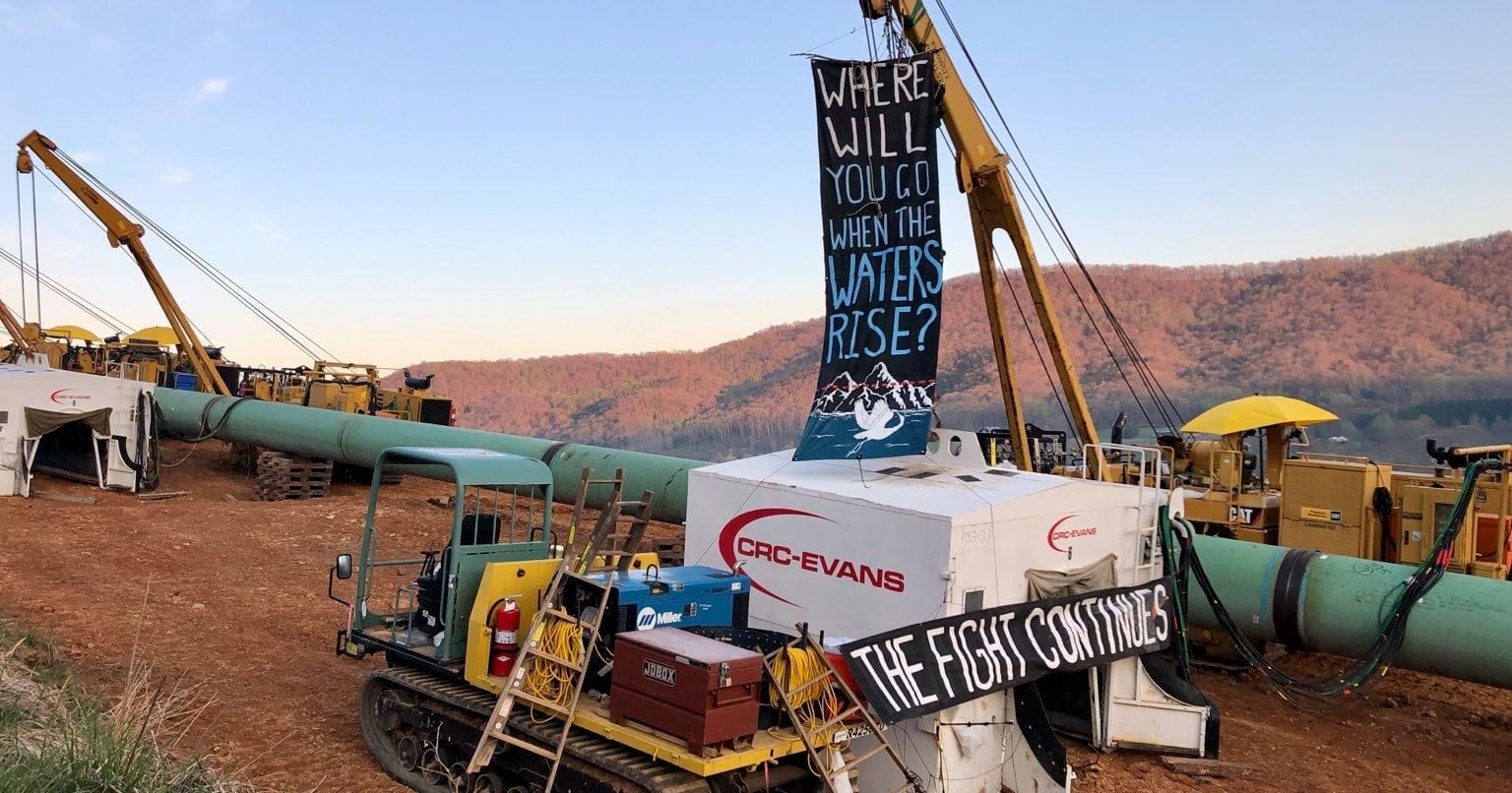By Donald Shaw and David Moore, Sludge
Bundled into the agreement between President Joe Biden and House Speaker Kevin McCarthy to suspend the debt ceiling for two years is language approving construction and operation of the Mountain Valley Pipeline, a project that would transport fracked gas more than 300 miles from the Marcellus shale fields in northern West Virginia to southern Virginia.
The Mountain Valley Pipeline, known as the MVP, is being fast-tracked after its owners have showered millions of dollars worth of campaign contributions on lawmakers in both parties—especially to Senate Majority Leader Chuck Schumer and McCarthy, the two individuals in Congress with the most control of what gets passed into law.
Schumer has received at least $371,000 in campaign contributions from the PACs and employees of Equitrans, NextEra Energy, and ConEdison, three of the five companies behind the pipeline. Most of that money, $274,400, was donated to Schumer’s campaign in April 2021 by executives and other employees of NextEra. Those donors include many executives, directors, and vice presidents, such as President and Chief Executive Officer John Ketchum, who gave the legal maximum of $5,800, and Executive Vice President of Engineering & Construction and Integrated Supply Chain Ronald Reagan, who also gave the maximum amount.
McCarthy’s campaign, joint fundraising committee, and leadership PAC received a combined at least $305,500 from the PACs and employees of the MVP owners NextEra Energy and Equitrans. McCarthy got his largest donation from NextEra’s PAC this past February when his joint fundraising committee was given a donation of $50,000.
Though the greenlight for the MVP has long been pursued by the fossil fuel industry, a federal court ruled against the project several times in the past few years over its compliance with environmental laws such as water quality standards. Environmental groups and climate scientists have strenuously opposed the MVP’s approval based on its environmental impacts and potential greenhouse gas emissions.
Since 2018, the MVP has faced court challenges based on how the project could affect conservation issues like soil erosion, wildlife, waterways, and old-growth forest, as well as approval to run through the Jefferson National Forest. The Biden-McCarthy debt ceiling agreement would sweep away these legal challenges: according to the text, all permits for MVP’s “construction and initial operation at full capacity” would be approved. If the language becomes law, the Secretary of the Army must issue “all permits or verifications necessary” within 21 days, and further judicial review of permits by any government agency would be prohibited. Before the debt ceiling deal was announced, the Biden administration moved earlier this month to approve a key permit for the MVP.
In addition to the Pennsylvania-based energy company Equitrans and utility giants NextEra and ConEd, the MVP is constructed and owned by a joint venture with a pair of gas companies, WGL Midstream and RGC Midstream. The project’s cost has ballooned to $6.6 billion since its announcement in 2014.
On Monday, 175 organizations signed a letter to Schumer and House Minority Leader Hakeem Jeffries (D-N.Y.) that urges them to vote on a debt ceiling deal that does not include the MVP approval or several other provisions. Arguing against the MVP, the letter says, “This project is equivalent to the emissions from 26 coal plants and would sacrifice Appalachian communities to decades more of hazardous pollution.” Environmental nonprofit The Sierra Club also came out against the deal.
Just after the debt ceiling agreement was announced, Democratic Sen. Tim Kaine of Virginia said that he would file an amendment to strip out the MVP approval from the bill, an effort joined by several House Democrats representing the region.
The Biden-McCarthy deal, titled the Fiscal Responsibility Act of 2023, would also apply new work requirements to some older adults who receive food stamps, cap non-defense discretionary spending for the 2014 fiscal year, claw back a portion of the funding boost for the I.R.S. that was passed last year in the Inflation Reduction Act, and more.
West Virginia Democratic Sen. Joe Manchin issued a statement taking credit for getting MVP across the finish line, recognizing McCarthy and his leadership team for including the provisions in their debt ceiling demands. In the 2022 election cycle, Manchin was the top recipient of oil & gas industry donations among all federal lawmakers, raking in nearly $769,000 during that period. Over the past few years, Manchin has repeatedly pushed for the pipeline to be approved in exchange for his vote in favor of the Democrats’ legislative agenda, as well as for “must pass” bills to fund the government and prevent a national debt default.
Schumer and Manchin originally came to a backroom agreement last summer that the Senate would pursue passage of a legislative package on energy project permitting reforms in exchange for him voting in favor of the Inflation Reduction Act. The initial outlines of the permitting reform deal did not indicate the MVP would be specifically addressed, but when Manchin unveiled the text of the package that September, it included a provision requiring the federal government to issue all permits and other authorizations necessary for the construction and operation of the MVP within 30 days. Manchin and Schumer attempted to attach the package to a continuing resolution that Congress had to pass in order to keep the government funded, but Manchin called for the package to be withdrawn from the funding bill after both Democrats and Republicans revolted.
Manchin has pulled in more than $89,000 from the MVP owners’ PACs and employee donations through his campaign and leadership PAC. A large portion of that money was given to his campaign in the first quarter of last year from employees of NextEra, including Ketchum, Reagan, and several more of the company’s leaders.
Even larger amounts were given by the MVP owners to the campaign arms of the Democrat and Republican caucuses of the House and Senate. The Democratic Congressional Campaign Committee and the Democratic Senatorial Campaign Committee have received more than $850,000 from the MVP owners since 2019, while their Republican counterparts have received more than $637,000. These party organizations spend their money on campaign ads to help the reelections of their incumbents, and on other things such as email list rentals and recount legal services.
Sen. Kyrsten Sinema (I-Ariz.) has received at least $115,000 from MVP’s co-owner NextEra, with $83,000 coming from executives and other employees plus $32,000 from the company’s PAC. Like with Manchin, the support of the centrist Sinema can often be pivotal to determining whether or not something passes the Senate.
Lobbying Push on Environmental Review
The debt ceiling agreement also seeks to push through changes to the landmark National Environmental Policy Act (NEPA) that would limit or change its requirements for reviewing energy projects. NEPA would be amended by the deal in several ways, such as setting page limits for environmental reviews, eliminating environmental reviews for projects outside the U.S., and providing for a lead agency to take charge when multiple agencies have jurisdiction over a project. Overhauling the NEPA review process has long been a goal of major energy industry lobbying groups to which the MVP owners belong—changes that the Sierra Club warns would gut environmental protections.
Equitrans is a member of the largest fossil fuel industry trade group, the American Petroleum Institute (API), which is applauding the debt ceiling agreement and highlighted its support for the MVP in 2016. On May 23, API lobbyist Lance West, a former chief of staff to Manchin, met with staff for West Virginia Republican Rep. Carol Miller to discuss including the MVP’s approval in the debt ceiling deal. Also this month, API supported permitting reform legislation introduced by West Virginia Republican Sen. Shelley Moore Capito that would implement time limits on legal challenges to energy projects, among other permitting changes, and includes a section titled “expediting completion of the Mountain Valley Pipeline.” Moore Capito, the ranking member of the Senate Environment and Public Works Committee, previously said the legislation would speed construction of the MVP.
Equitrans has lobbied on the MVP every quarter since the second quarter of 2020, according to Senate disclosures, spending a total of $480,000 on lobbying Congress, the Department of the Interior, and others on its pipeline project.
The Florida-based electric utility NextEra is a member of more deep-pocketed lobbying groups, according to its most recent corporate political disclosure, including the Edison Electric Institute (EEI), the U.S. Chamber of Commerce, and the big business group Associated Industries of Florida, among others. In a statement, EEI President and CEO Tom Kuhn similarly applauded the permitting reforms included in the debt ceiling deal, and the U.S. Chamber stamped the deal with its approval, deeming it a key vote.
Manchin has another financial tie to EEI, the trade group representing all privately-owned electric companies that operate as public utilities. While in the Senate, Manchin has drawn millions of dollars in income from a family-held coal company, Enersystems. The company is the primary contractor at a West Virginia power plant that provides electricity to electric company Mon Power, an EEI member.
Nearly 300 groups including Food and Water Watch and the Indigenous Environmental Network urged another approach to permitting reform in a letter sent earlier this month to President Biden and congressional Democrats, one that includes deploying energy efficiency measures and supporting renewable energy delivery on existing transmission lines.



